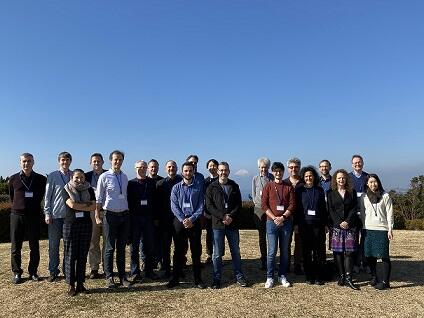NO.153 The 3rd Controlled Adaptation of Self-adaptive Systems (CASaS)
January 13 - 17, 2020 (Check-in: January 12, 2020 )
Organizers
- Kenji Tei
- Waseda University, Japan
- Nir Piterman
- University of Gothenburg, Sweden
- Javier Camara
- University of York, United Kingdom

Overview
Description of the Meeting
Self-adaptive systems are required to adapt their behaviour in the face of changes in their environment and goals. Such a requirement is typically achieved by developing a system as a closed-loop system following a Monitor-Analyse-Plan-Execute (MAPE) scheme. MAPE loops are a mechanism that allows systems to monitor their state and produce changes aiming to guarantee that system goals are met. In practice it is often the case that to achieve their desired goals, self-adaptive systems must combine a number of MAPE loops with different responsibilities and at different abstraction levels.
Higher-level goals require decision-level mechanisms to produce a plan in terms of the high-level system actions to be performed. Various mechanisms have been proposed and developed for automatically generating decision-level plans (e.g., event-based controller synthesis), providing guarantees about the satisfaction of hard goals (e.g., providing a certain level of service), and supporting improvements in soft goals (e.g., achieving goals in an efficient or cost-effective manner). These decisions are often made at time scales that can range from seconds to minutes.
Lower-level goals, on the other hand, typically require control mechanisms that sense the state of the system and environment and react at a fine time granularity of milliseconds. Solutions to this problem are typically based on classical control theory techniques such as discrete-time control.
A successful adaptive system, then, must find ways to integrate these multiple levels of control, leading to important questions such as how to achieve such integration in the best possible way, and which abstractions and mechanisms are appropriate to enable such approach. Additionally, concepts from classical control theory (typically applied at low levels of control) can also be useful in understanding higher-level control.
Recently the software engineering community has begun to study the application of control theory and the formal guarantees it provides in the context of software engineering. For example, the 2014 Dagstuhl Seminar “Control Theory meets Software Engineering”, is an example of such recent interest. That seminar discussed a variety of possible applications of control theory to software engineering problems.
Additional examples, and perhaps more relevant, are the 1st CASaS Shonan seminar held in 2016 and the 2nd one held in 2017. The 1st CASaS focused on formal guarantees that can be provided in self-adaptive systems via the use of control theory (e.g., event-based controller synthesis and discrete-time control). The seminar was an active gathering of outstanding researchers in both control theory and software engineering, and provided a forum in which discussions on the connections between control theory and software engineering for self-adaptive systems could be held. Most of the attendees expressed their intention to continue studying and discussing the relation between control theory and software engineering, which was highlighted as key to address systematic provision of guarantees about the satisfaction of requirements in self-adaptive systems.
The 2nd CASaS aimed to suggest foundations of the integration.The seminar focused on sharing basic knowledge of the both communities and discussing two key topics for identifying foundations and challenges: properties and composition. The discussion continued even after the seminar and results of the discussion were presented in two reports: “Bridging the Gap between Control and Self-Adaptive System Properties: Identification, Characterization, and Mapping” and “Composition and Cooperation of Multiple Control Strategies: Automating Control Switch with High-Level Guarantees”.
The success of the two previous CASaS seminars motivates us to continue further exploration of the foundation and challenges of the successful integration of multiple levels of control and start consolidating the product of our discussions by focusing on a concrete domain. The 3rd edition of CASaS aims at involving key researchers in robotics in addition to key areas that were present in the past two seminars such as Self-Adaptive Systems, Control theory, Game theory, Software Engineering, and Requirements Engineering. This will create an ideal environment to discuss possibilities of control theory as a mechanism to provide formal guarantees of not only for low-level goals but also high-level goals of self-adaptive systems (e.g., convergence, safety, stability) in the robotics domain.
Among the research questions that we expect to discuss are: How to coordinate multiple levels of adaptive control in the robotics domain? What kinds of properties from classical control theory can be applied at higher levels to guarantee certain properties? To what extent does integration of classical control theory and self-adaptive systems contribute to challenges in the robotics domain? In what ways can AI techniques of planning and machine learning be applied to adaptive systems? How can one deal with uncertainty in a systematic fashion and at different levels of abstraction?
We envisage the 5-day meeting to be organised in two main parts. During the first day, participants will quickly present their background and what topics they are interested in. Then, for the remaining four days, we will identify and discuss the most relevant topics selected by the participants in working groups. Finally, we plan to summarise the workshop’s findings, create draft reports, and propose future actions.
We expect the meeting to encourage participants from different areas and communities to interact and actively search for common interests that may result in possible collaborations and joint papers.
